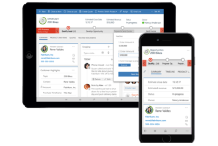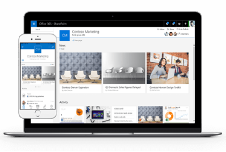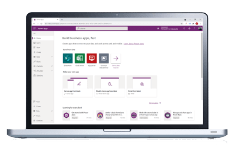Lead management lifecycle
Typically, while a sales rep or account rep is bringing a lead through the qualification process, different tasks or actions are performed to determine whether it should be qualified or disqualified.
Here are some examples:
- Identify potential stakeholders who have an interest in the project.
- Identify potential competitors who are also speaking or might be speaking with the lead.
- Research the lead to learn more about his or her organization, the organization's annual revenue, or the organization's position in its industry.
- Have phone calls or meetings to learn about the lead's situation.
After account managers receive the leads that are assigned to them, they can use multiple tools to do some basic research about the leads before reaching out to them. Those tools might include social media and artificial intelligence. Then, when they reach out to the leads, the account managers can capture details from their phone calls or appointments to help make the final qualification decision.
Working with lead views
Microsoft Dynamics 365 provides multiple views that show lead data. You can use these views when the lead entity is selected in the Sales Hub app. Each view is pre-filtered to show leads in a different way. By default, agents see the leads that have been assigned to them. But agents can select different views to see different sets of leads.
Here are some of the lead-related views that Microsoft Dynamics 365 includes:
- Open Leads- All leads that are currently open, regardless of who the lead owner is.
- Closed Leads- All leads that have been closed. Both qualified and disqualified leads are included.
- All Leads- All open and closed leads.
- My Open Leads- All the open leads that are assigned to the signed-in user.
- Leads opened last week- All leads that were created last week.
- Leads opened this week- All new leads created during the current week.
Depending on their role, people can use these different views to help with their job functions. For example, sales managers might use the Leads opened this week view to see all the newest leads that have been added. After they identify one or more leads that should be assigned to a specific account manager, they can select those leads and then select Assign on the command bar to assign them to that account manager.
Account executives might use the My Open Leads view to see only the leads that have been assigned to them. They can then open a specific lead to view all the relevant data about that lead.
The information in individual lead records is divided among multiple sections. Here is a description of some of the main sections and the types of information that they include:
- Timeline- This pane shows related lead activities. All activities appear in chronological order. Activities might include phone calls that were made to or received from the lead, appointments with the lead, internal posts that colleagues have made about the record, or notes that were added about the record.
For example, the timeline might list all the appointments that the account executive has had with the lead. The account executive can then open each appointment to gather additional information from that meeting.
- Relationship Assistant- This pane provides reminders or notifications about items that are related to the lead.
For example, the Relationship Assistant might provide a reminder about an upcoming appointment with the lead. The account executive can then view the appointment details by opening the record directly from the lead.
- Stakeholders- This grid identifies people who might have a vested interest in or be involved in the decision-making process. Typically, stakeholders are contact records that are noted in the record.
For example, a stakeholder might be a lawyer that the organization uses, a project lead, or board members who are involved in the decision-making process.
- Competitors- This grid identifies any other vendors that your organization might be competing with for the lead's business.
- Business process flow- Business process flows (BPFs) represent guided business processes that lead account executives through the whole sales lifecycle.
Depending on the type of lead, or company procedures, a lead might have multiple business processes that can be switched to, depending on specific details in the lead record. These details can include the lead source, estimated budget, purchase timeframe, or other business factors.
Related Links
Dynamics 365 for Sales – Lead Qualification
Dynamics 365 – Changes to how you administer your Dynamics 365 instances
Dynamics 365 Project Operations
Dynamics 365 for Sales – Working With and Creating Leads in Dynamics 365
Dynamics 365 Consulting
Dynamics 365 Project Operations Consulting















